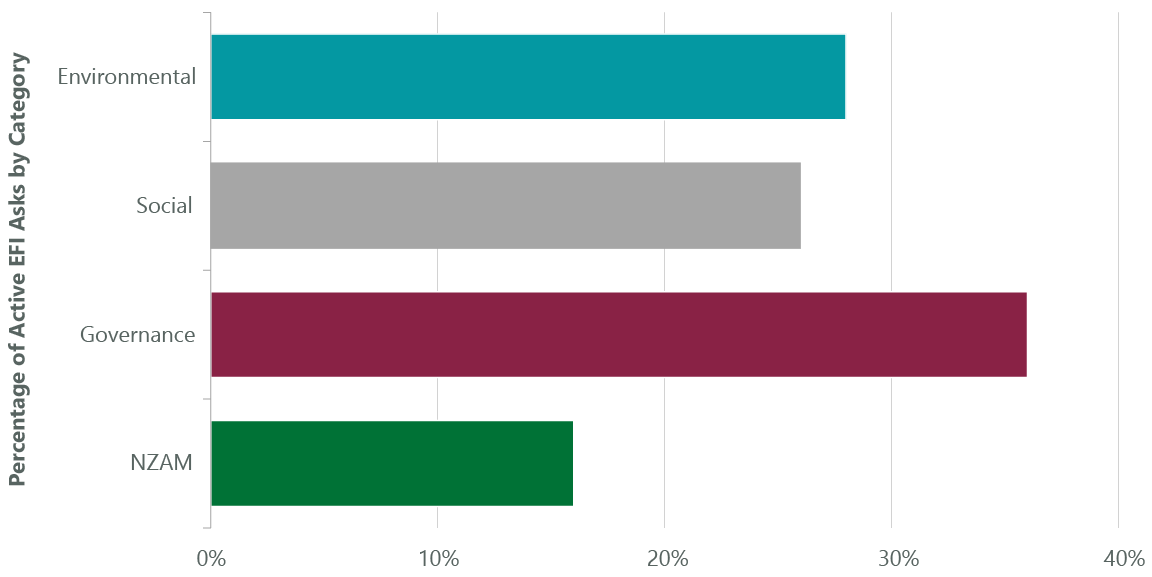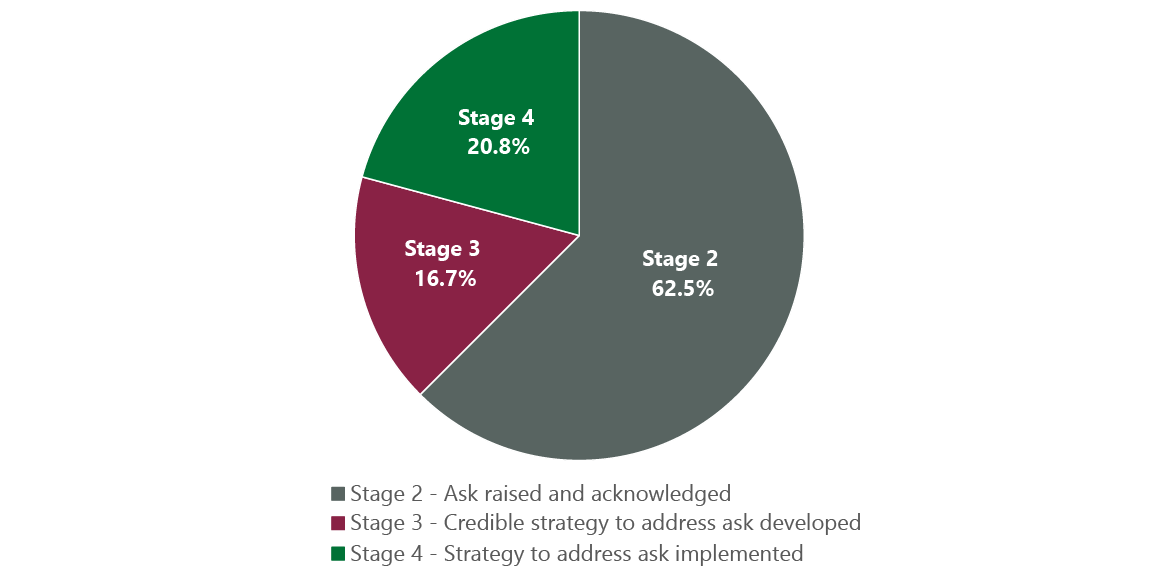Edwin Tan
By Hannah Barr, Senior ESG Associate| Naveen Jayasundaram, Sr. Analyst – Media & Internet | Mary Jane McQuillen, Head of ESG, Portfolio Mgr. | Hannah Whang, Senior Analyst – Industrials
Measuring Impactful Company Engagements
An Enhanced Internal Engagement Initiative
Engagement to drive positive change in public equities has been a longstanding part of ClearBridge’s investment decision making and active ownership. As a long-term shareholder with an average stock holding period of five years, ClearBridge has cultivated strong and lasting relationships with company management teams. With this unique position and decades of industry experience, we’ve taken steps to better structure, measure and communicate the progress and outcomes of key engagements, and in 2022 we launched an enhanced internal engagement initiative, Engage for Impact (EFI).
The initiative encourages targeted engagements that we believe have a strong likelihood of creating positive impact, which we define as the creation of long-term positive environmental or social outcomes for the benefit of all stakeholders in public companies: their investors — our clients — and their employees, customers, suppliers and communities.
While we believe our work can often influence significant improvement at the company level, we also recognize we are one of many shareholders working to create change. In many cases this collective voice is what ultimately leads to positive, real-world impact.
As a part of this new initiative, investment team members develop specific “asks” or areas of improvement for priority target companies. Progress against these “asks” is then monitored and reported on over time.
As long-term investors, our company engagements can take place over a multiyear period. Therefore, throughout the course of the engagement, we track and categorize company progress by stages (Exhibit 1).
Exhibit 1: Engage for Impact Progress Framework

Source: ClearBridge Investments.
Using this framework, we can better monitor and track a company’s responsiveness and progress against key performance indicators and report on these outcomes over time. EFI engagements follow a consistent structure, prioritize topics closely aligned with value creation, represent a wide variety of sustainability topics (Exhibit 2), and are often rooted in firmwide focus areas like net zero, biodiversity, human rights, as well as diversity, equity and inclusion.
Exhibit 2: Engage for Impact Asks by Category

As of Dec. 31, 2023. Source: ClearBridge Investments.
Given this enhanced initiative is still in the early stages, most of our EFI company asks are currently categorized as early stage or in-process (Exhibit 3). Examples of company asks focused on reducing emissions, improving labor relations, expanding electric vehicles (EVs), improving board effectiveness and implementing total shareholder return (TSR) metrics convey the spirit and overall benefits of the initiative.
Exhibit 3: ClearBridge Engage for Impact Asks by Stage

As of Dec. 31, 2023. Source: ClearBridge Investments. Stage 1 is not captured in the data because all EFI asks in the initiative have progressed past that stage.
Decarbonizing Aviation: United Parcel Service
Reducing emissions is a common ask among ClearBridge’s company engagements broadly. For an EFI with United Parcel Service (UPS), we acted on the opportunity to formulate a specific ask for a reduction in Scope 1 and 2 emissions from its aviation fleet, which comprises ~300 planes. We actively engage with UPS on setting aggressive carbon reduction targets as its stock is held in a strategy that is in-scope for ClearBridge’s net-zero commitment.
In our engagements with UPS, we have discussed how due to heavy reliance on future technologies such as sustainable aviation fuel, the company recognizes it cannot credibly set a company-wide target approved by the Science-Based Targets initiative (SBTi) at this time. However, the company has acknowledged our ask as a key area of focus over the next 10-15 years and recognizes decarbonizing its aviation fleet is a key part of the global energy transition. It also recognizes the need to align all other parts of the business with a net-zero pathway in an effort to decarbonize. Efforts currently underway include investments in electrical vertical takeoff and landing aircraft and full electrification of its ground fleet, with a 2025 goal of 40% alternative fuel for ground vehicles, up from 24% today. We will continue to engage UPS as a stage 2 EFI to monitor progress against other reduction targets and continue to urge the company to decarbonize its aviation fleet.
Bettering Driver Relations and Expanding EVs: Uber
In stage 3 of an EFI the company has acknowledged the ask and has developed a credible strategy to address it. The company may even have begun and be well along in addressing it, as is the case with Uber and two asks we have formulated to: 1) improve driver satisfaction, and 2) expand its adoption of EVs toward achieving its net-zero goal.
We’ve engaged Uber since its IPO in 2019 as concerns over employee classification have led to questions of worker pay and benefits that we felt overshadowed other merits of its rideshare business, for example rideshare’s democratization of transportation and Uber’s impressive safety record.
In December 2019, we met with the company to discuss driver earnings and shared our view that drivers should remain contractors with added benefits and pay protection. At that time, Uber had already shifted its operating philosophy to a more conciliatory approach and improved relationships with contracted partners with guaranteed pay minimums, portable benefits and bargaining rights.
We continued the conversation as part of regular meetings with the company over subsequent years, and at a January 2024 meeting with Uber’s CEO, CFO and other representatives, we were pleased with progress made against both asks. Management highlighted improvements made to the driver experience, including technology, earnings and worker flexibility. Specifically related to driver earnings, the primary concern, drivers on the platform currently earn an average of ~$36 per utilized hour on a gross basis and low-$20s net of expenses and overhead. Up-front fares, which are now being rolled out globally, provide improved earnings transparency. On fairness, where drivers see anywhere from a 0% to 50% take rate (the percentage Uber takes of gross margins), Uber plans to share weekly reports with drivers clarifying take rates and distributing make-whole payments where appropriate.
To achieve its SBTi-approved net-zero goal by 2040, Uber is focusing on driver incentives and education to drive adoption of EVs across its platform. Results so far are promising and getting better: 4.7% of Uber’s trip miles driven in the U.S. and Canada are completed in zero-emission vehicles, even though EVs represent just ~1% of total cars on the road in the U.S.
Enhancing Board Quality and Operational Efficiency: Comcast
Comcast (CMCSA) is also at stage 3 in its EFI action as it is making measurable progress on EFI asks regarding 1) addressing some concerns from third-party governance research providers on overboarding and board effectiveness, 2) setting verified science-based targets and 3) addressing efficiency of operations, specifically as it relates to suppliers.
In December 2019, we engaged Comcast on a variety of ESG topics and raised the issue of board independence. We followed up in May 2020 when we discussed a proxy proposal on the split Chairman and CEO role. Following this meeting, Comcast improved the independence of its board, upping the percentage of independent director nominees from 80% in 2019 to 89% in 2022, as well as improving board diversity, from 40% of director nominees being diverse by gender or race in 2019 to 44% in 2022.
In December 2022, we continued the conversation around board effectiveness and engaged the company on its board structure, raising concerns around overboarding or having board members sit on too many boards, which may compromise their ability to serve the board effectively. This issue has been flagged by third-party governance research providers.
In a December 2023 engagement, Comcast shared that it was making progress addressing overboarding by bringing down the average tenure of its board by incorporating a policy on director overboarding into its corporate governance guidelines that limits the number of public company boards on which directors may serve. As part of the policy, no director who also serves as CEO at a public company may serve on more than three public company boards. A notable example is lead independent director Ed Breen, who is also the current CEO of DuPont de Nemours (DD). He proactively sought to reduce the number of boards he sits on and chose not to stand for re-election to the board of International Flavors & Fragrances at the company’s 2023 annual meeting.
Also at our December 2023 meeting, Comcast disclosed its Scope 3 emissions for the first time and committed to setting a verified science-based target. The company has begun engaging suppliers on committing to set a verified target, and going forward, it will set clearer targets around Scope 3 emissions. Regarding our ask around operational efficiency, Comcast has reduced the electricity needed to deliver each byte of data across its network by 36% since 2019 and is pushing its suppliers to be more efficient.
Improving Incentive Metrics and Committing to Net Zero: Western Digital
In a completed EFI journey, Western Digital (WDC) has implemented a strategy to address asks we made over several engagements to 1) institute relative total shareholder return (TSR) incentive metrics to evaluate shareholder value creation compared to industry peers, 2) improve energy intensity levels of manufacturing in line with industry peers and 3) commit to a net-zero target.
Specifically, Western Digital reduced the energy intensity of manufacturing its products by >13% from FY21 to FY22. It added relative TSR metrics to its incentive comp, which we view as positive as it aligns management compensation with execution, whereas before management would benefit from the fact their industry is growing faster than the broader market. On the third ask, in June 2023 the company announced an ambitious target and has committed to net zero Scope 1 and 2 emissions across its operations by 2032. Its target includes goals to reduce Scope 1 and 2 emissions by 42% by 2030 and to reduce Scope 3 use-phase emissions/terabytes by 50% by 2030, both from a 2020 base year. Its targets were approved by SBTi in 2021, and since then Western Digital has achieved nearly 15% absolute Scope 1 and 2 emissions reductions.
We look forward to sharing more successful EFI case studies in the future as our EFI target companies continue to make measurable progress against our asks.
Hannah Barr, Senior ESG Associate | Naveen Jayasundaram, Sr. Analyst – Media & Internet | Mary Jane McQuillen, Head of ESG, Portfolio Mgr. | Hannah Whang, Senior Analyst – Industrials
Past performance is no guarantee of future results. Copyright © 2023 ClearBridge Investments. All opinions and data included in this commentary are as of the publication date and are subject to change. The opinions and views expressed herein are of the author and may differ from other portfolio managers or the firm as a whole, and are not intended to be a forecast of future events, a guarantee of future results or investment advice. This information should not be used as the sole basis to make any investment decision. The statistics have been obtained from sources believed to be reliable, but the accuracy and completeness of this information cannot be guaranteed. Neither ClearBridge Investments, LLC nor its information providers are responsible for any damages or losses arising from any use of this information.



